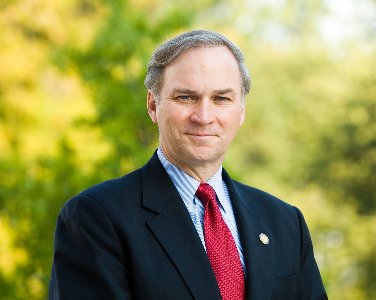Lawmakers Back School Officials on Trial for Luncheon Prayer
 Sixty members of Congress have joined a chorus of Christians backing a Florida high school principal and athletic director who are due to go on trial this week for praying during a school-sponsored luncheon.
Sixty members of Congress have joined a chorus of Christians backing a Florida high school principal and athletic director who are due to go on trial this week for praying during a school-sponsored luncheon.
Members of the bipartisan Congressional Prayer Caucus have said they are standing with Pace High School Principal Frank Lay and Athletic Director Robert Freeman, who face up to $5,000 in fines, six months jail time and loss of their retirement benefits for allegedly violating a court order prohibiting prayer. The pair’s trial is scheduled for Thursday.
(Photo: Rep. Randy Forbes)
“The tradition of offering prayer in America has become so interwoven into our nation’s spiritual heritage, that to charge someone criminally for engaging in such an innocent practice would astonish the men who founded this country on religious liberty,” the caucus group said in a letter sent Monday.
Rep. Randy Forbes, R-Va.; Rep. Mike McIntyre, D-N.C.; and Rep. Jeff Miller, R-Fla., wrote the letter on behalf of the 54-member caucus. Forbes said 60 members of Congress had signed on to the letter.
The Florida case stems from a lawsuit the American Civil Liberties Union (ACLU) filed last year on behalf of two students who claimed several school officials violated church-state separation by promoting their religious beliefs in school.
Rather than fight the lawsuit, the Santa Rosa County school district consented to a broad injunction prohibiting all prayer at school-sponsored events. The district then consented to an even broader order fashioned by the ACLU, which prohibits school officials from promoting, endorsing, participating in or causing prayers during or in conjunction with school events.
In January, before the order was enacted, Lay asked Freeman to say a “prayer of blessing” at a luncheon held at the school. The ACLU accused the two of violating the temporary injunction, and a federal judge initiated criminal contempt proceedings against the two and referred the case to the U.S. Attorney’s office for prosecution.
In a speech on the House floor Tuesday night, Forbes said the case signifies the potential for the criminalization of prayer in the U.S. He said the final order issued is so broad that it would prohibit the president from giving a speech in the school district that ended with the phrase “God bless America.”
“If this action is allowed to stand, make no mistake, there will come a day when the speaker of this House will be hauled into federal court and threatened with jail because she dares to stand at that podium where you stand tonight and ask the chaplain to start our day with prayer,” he said. “If this case stands, there will come a day when that chaplain is carried to court and threatened with jail because he offers that prayer he’s asked to offer. … It’s time for Americans to say enough is enough.”
Prayer leader Cindy Jacobs, founder of Texas-based Generals International, is calling on Christians to pray during the hearing on Thursday. In an e-mail distributed through Jacobs’ prayer network, Ken Malone of the Florida Alliance for Reformation said the case could be a catalyst of reformation in Florida and the start of restoring prayer in Jesus’ name to public schools.
“This is one of the most critical issues facing the body of Christ in our nation,” he wrote. “It has been described by a pastor from Pace as David vs. Goliath.”
He said there are signs of a groundswell around preserving prayer. He pointed to a prayer rally and fundraiser for Lay and Freeman last week that drew 1,500 people and the Pace High School graduation in May, where nearly 400 seniors recited the Lord’s Prayer.
“It’s time to tip the scales of justice through intercession,” he wrote, calling on pastors and prayer leaders to dedicate significant time to praying for the outcome of the case. He also urged Christians to pray at the courthouse on Thursday.
Attorney Mathew Staver, founder of Liberty Counsel, which is representing Lay and Freeman, said he is optimistic about the case. Late last month, federal District Judge Casey Rodgers ruled that Michelle Winkler, a school receptionist accused of violating the same order as Lay and Freeman, would not be held in civil contempt for asking her husband to bless the meal at a privately sponsored banquet for noninstructional staff.
Although Lay and Freeman face criminal rather than civil contempt charges, Staver expects prosecutors to have a hard time proving the men had a criminal motive behind their prayers, which the criminal contempt charge requires.
Staver also plans to challenge the constitutionality of the order banning prayer.














































